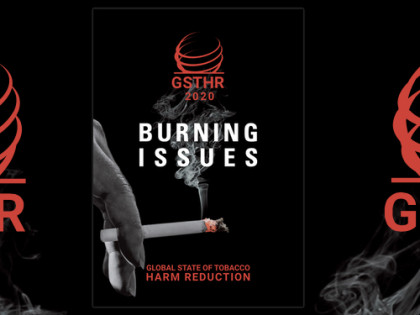Bates illustrates that two key facts are that both global numbers of smokers and cigarettes consumed are holding firm. As Big Tobacco targets poor countries and uneducated populations the advances made in reducing numbers in developed countries are obliterated.
“Nicotine is addictive and habit-forming, and it is very toxic by inhalation, in contact with the skin, or if swallowed. It is not intended for women who are pregnant or breast-feeding, or people who take medicine for depression or asthma. Nicotine can increase your heart rate and blood pressure and cause dizziness, nausea and stomach pain.”
Is this a statement from the World Health Organisation? Maybe it is part of a new blog post by Professor Glantz? If you were told it featured as part of the latest campaign by the Californian Department of Public Health it would be entirely believable. But it isn’t; this is the new approach being taken by Altira and printed on their packs of MarkTen cigalikes.
This is relevant because Bates compares prediction graphs to the statements that tobacco should been ironed out by 2030, 2040 or any other date plucked from the air: the statistics don’t support a notion that it can be achieved in such a small timescale. This comes from simple analysis and the knowledge that Big Tobacco will not go gently into that good night – and, unlike Dylan Thomas’ father (to whom the poem was written), tobacco companies are anything but blind to events around them.
Bates notes that vaping’s incursion into the tobacco market value in Britain and the US has been achieved against a backdrop of “a massive well-funded relentlessly hostile campaign against these products by many American public health organisations and academics.”
Reynolds, owners of the Camel brand, has yet to take the big leap into ecigs – but even they are demanding regulations to restrict development and use. Last year they called for the FDA to ban open system e-cigarettes, including all component parts. They argued that they present a unique risk for adulteration, tampering and quality control. No doubt this concern for the health of consumers will warm the cockles of ecig users’ hearts.
As legislators and Big T jockey for positions in their head to head battle electronic cigarettes stand to be pawns in the chess game. He notes: “the future of these products depends on many things other than the products themselves and interplay of manufacturers and consumers. It will particularly depend on the role played by regulators and by the ‘public health establishment’, which has in most cases taken a very hostile approach.”
The admission of hazard resulting from MarkTen’s nicotine is a move similar to that of large tobacco firms in the 90s. Small tobacco enterprises claimed at the time that the larger companies would use legislation as a tactic to force the small fry out of the competition. This is a process being echoed today as Big T brands seek to do the same thing to nullify competition from businesses currently enjoying success in the electronic cigarette market. As Reuters report: “By accentuating the risks of 'vaping,' they say, big firms may deter smokers from trying the new devices, even though most scientists agree they are safer.”
It should be noted that Altira didn’t worry too much about consumers when they mailshotted unrequested packs of MarkTen to family homes.
Bates continues his treaty in policy analysis here, where he covers potential moves from legislators and critiques the proposals. But, as Derek Yach, a former head of tobacco control at the World Health Organization, says: "if the dominant message is one of doubt, then the status quo gets maintained." The question for vaping and vapers is whether we can remove that element of doubt.
Dave Cross
Journalist at POTVDave is a freelance writer; with articles on music, motorbikes, football, pop-science, vaping and tobacco harm reduction in Sounds, Melody Maker, UBG, AWoL, Bike, When Saturday Comes, Vape News Magazine, and syndicated across the Johnston Press group. He was published in an anthology of “Greatest Football Writing”, but still believes this was a mistake. Dave contributes sketches to comedy shows and used to co-host a radio sketch show. He’s worked with numerous start-ups to develop content for their websites.
Join the discussion
Irreconcilable Conflict on RegWatch
Clive Bates gives another of his compelling appearances on Regulator Watch, where he talks about tobacco control crusaders and their principle of “irreconcilable conflict”
Australian Committee Submission
Expert Clive Bates has submitted a document to the Australian Senate Select Committee on Tobacco Harm Reduction
Bates On Burning Issues
Advocate and expert Clive Bates spoke at the launch of Global State of Tobacco Harm Reduction’s Burning Issues report
Endgames
Advocate and expert Clive Bates has spoken about ‘the fundamental confusion’ in public health aims for tobacco and nicotine policy






-listing400.jpg)




